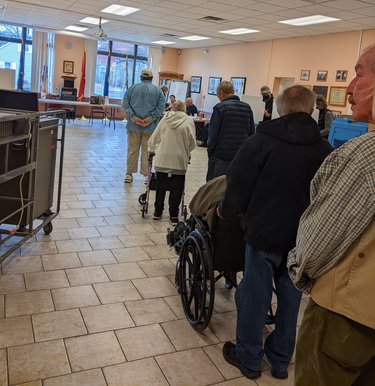Public to weigh in on having just one place to vote in Rensselaerville
Enterprise file photo — Melissa Hale-Spencer
One Rensselaerville Town Board member said he worried there would be a line on Election Day if the town had just one polling place. This line on Nov. 7, 2023 was at the Guilderland Center firehouse. Guilderland pays the county’s board of elections over $70,000 annually for polling.
RENSSELAERVILLE — With an eye on saving money, but mindful about the potential consequences for voters, the Rensselaerville Town Board is inviting residents to share their thoughts on reducing the number of polling stations in town from three to one.
A public hearing is scheduled for Feb. 8 at 6:30 p.m. at the town hall.
Currently, Rensselaerville has polling places at each of its three fire stations. Supervisor John Dolce floated the notion early last month of instead having one polling place, at the town hall, because the costs associated with polling locations are rising and difficult to predict.
Costs grew from more than $6,600 in 2018 to nearly $12,800 in 2023 — a 93-percent increase, according to a post the town published on its Facebook page announcing the hearing.
“Next year, we could budget $14,000, and it may be $17,000,” Dolce said at the town board’s most recent meeting, on Jan. 25.
Several years ago, Albany County adopted an election mandate that has the county’s board of elections charge towns, villages, and cities for their election costs — often leaving municipalities unsure of the costs during their budgeting process.
Opinions from the remainder of the Rensselaerville board were mixed.
Councilman Randall Bates was concerned about the potential for clogging, as the foot-traffic would inevitably increase with only one polling place, which would have two machines.
“The last thing I want to do is have a situation where people come, they pull up and see a line out the door and they turn around and leave,” he said.
On the extra distance some voters would have to travel to vote at the town hall, Councilman Pete Somerville said that he “doesn’t think it’s that much further to drive,” but that the savings would be small relative to the town’s budget.
Councilman Brian Wood said the town could potentially enlist volunteers to transport any seniors who can’t or won’t drive each Election Day. The town should also, he said, put out a reminder to residents that they can sign up for an absentee ballot to save themselves the trip.
Currently, any registered voter in New York state may apply for an early mail ballot.
Wood said he’d personally prefer to see the firehouses spared from the headaches of being a polling place, but advocated for the public hearing, arguing that, even if the intention is to save money — usually a popular charge with residents — it’s not the board’s money to save.
“If the public wants it out there and they’re willing to pay for it out there, who the hell are we to tell them that we don’t want to spend that money?” he asked rhetorically.
Dolce, who said he’s been looking for ways to save money, said when the public-hearing idea was brought up that the residents who show up “are always going to say they don’t want change.”
Councilman Edward VanAuken said he was “leaning toward” a single polling site, but wanted to hear from the public.
Rensselaerville’s Hilltown neighbors — Berne, Westerlo, and Knox — each have just two voting districts, with between 1,000 and 1,400 voters enrolled within each, according to the Albany County Board of Elections.
While the districts in those towns cover between 1,000 and 1,400 voters, Rensselaerville has roughly 500 in each of its three voting districts, and the least total number of voters overall.
According to New York State Election Law, an election district cannot have more than 950 registered active voters, except when permission is granted by the county board of elections to have up to 2,000 voters.



